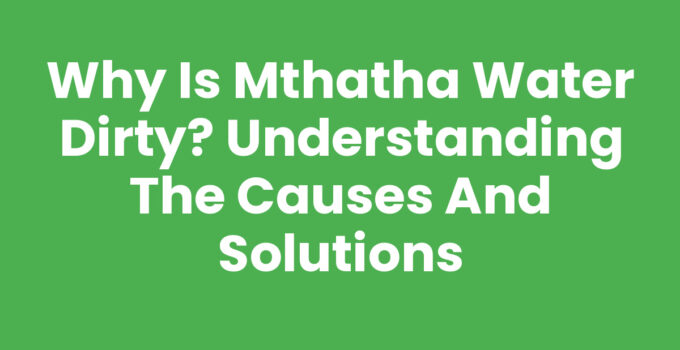Access to clean drinking water is a fundamental human right, yet many communities around the world struggle with water quality issues. Mthatha, a town in the Eastern Cape of South Africa, is no exception. Residents have raised concerns about the safety and cleanliness of their water supply. In this blog post, we will explore the reasons behind the dirty water in Mthatha and discuss potential solutions to this critical issue.
Why Is Mthatha Water Dirty?: Understanding the Causes
The question “Why Is Mthatha Water Dirty?” can be attributed to several interlinked factors that need to be addressed for effective solutions to emerge. Below are some of the main causes:
1. Aging Infrastructure
Much of the water infrastructure in Mthatha is over 30 years old and is in dire need of upgrades and maintenance. Leaks and breaks in aging pipes can lead to contamination as water may mix with wastewater, chemicals, or other pollutants. Regular maintenance and timely upgrades are essential to ensure a safe water supply.
2. Poor Waste Management
Mthatha struggles with inadequate waste management systems. Illegal dumping and the lack of recycling facilities contribute to surface and groundwater contamination. As rainwater washes pollutants into the water supply, the quality of drinking water deteriorates.
3. Agricultural Runoff
The surrounding agricultural areas contribute to the pollution of Mthatha’s water. Pesticides, fertilizers, and other chemicals used in farming often run off into local water bodies during rain, leading to greater levels of contaminants in the supply.
4. Lack of Effective Water Treatment
The water treatment facilities in Mthatha may not be equipped to handle the current demands or the quality of incoming water. Limited resources, technology, and staff training can prevent the effective treatment of water before it reaches households.
5. Community Practices
In some instances, community practices may contribute to water pollution. For example, bathing or washing clothes in rivers and streams can further degrade water quality. Educating the community about the impact of these practices is vital for collective efforts towards cleaner water.
Potential Solutions for Cleaner Water in Mthatha
Tackling the issue of dirty water in Mthatha requires a multi-faceted approach:
1. Infrastructure Investment
Investing in infrastructure upgrades will help reduce leaks and ensure safe drinking water reaches the community. This includes modernizing pipe systems and treatment plants to meet current standards.
2. Improved Waste Management
Implementing better waste management practices is essential. This can include organizing community cleanup days, improving collection methods, and enforcing laws against illegal dumping.
3. Agricultural Best Practices
Farmers should be encouraged to adopt sustainable agricultural practices that minimize chemical use and promote natural fertilizers. Workshops and education can play a crucial role in changing practices that harm local water quality.
4. Community Engagement and Education
Engaging with the community through education campaigns can raise awareness about the importance of clean water and how individual actions can contribute to this goal. Community members need to be on board with initiatives that promote better practices.
Conclusion
The issue of dirty water in Mthatha is a multifaceted challenge that requires joint efforts from local government, agencies, and residents. By tackling the root causes through a combination of infrastructure investment, improved waste management, and community education, there can be a significant improvement in water quality. It is imperative that actions are taken to ensure that the residents of Mthatha have access to clean and safe drinking water, a right that everyone deserves.
Frequently Asked Questions
What are the main causes of dirty water in Mthatha?
The main causes include aging infrastructure, poor waste management, agricultural runoff, lack of effective water treatment, and harmful community practices.
What can be done to improve water quality in Mthatha?
Solutions include investing in upgraded infrastructure, enhancing waste management systems, promoting sustainable agricultural practices, and engaging the community through educational initiatives.
Is the dirty water in Mthatha safe to drink?
No, the dirty water is not safe to drink due to contamination from various sources, including pollutants and inadequate treatment processes.









